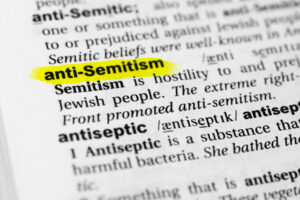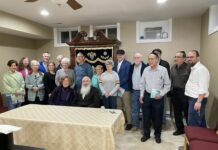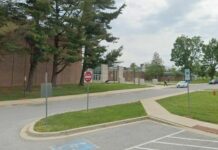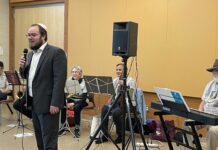
By Ellen Braunstein and Selah Maya Zighelboim
Since the Hamas attack on Oct. 7, the Anti-Defamation League has recorded a significant spike in antisemitic incidents — 315% increase compared to the same time period a year ago.
The spike in antisemitism has “absolutely” impacted Baltimore, said Howard Libit, executive director of the Baltimore Jewish Council.
“We’re seeing it on our college campuses in the area,” Libit said. “We’re seeing it in some of the high schools. We’re seeing it on social media in particular. Everyone involved in social media, whether they’re here or anywhere in the world, is seeing a huge spike in antisemitism.”
Many of the documented incidents have occurred on college campuses, including in the Maryland area, said Meredith Weisel, regional director for ADL covering Maryland, D.C., Virginia and North Carolina. Since the war erupted in Israel, “we’ve seen assault, harassment, vandalism and more at the hands of their fellow students,” she said.
Libit noted that some protests on multiple college campuses across the Baltimore area have included antisemitic rhetoric or antisemitic signs, such as “From the river to the sea.”
Weisel calls the average 25 incidents of antisemitism per day “alarming.”
“Unfortunately, as we have seen repeatedly, when conflict arises in the Middle East, particularly when Israel exercises its right to self-defense, antisemitic incidents increase here in the U.S. and around the world,” Weisel said. “I am worried because we see so many voices still justifying, excusing and even celebrating Hamas actions.”
Weisel stressed the importance of responsible members of the local, national and international community to “take concrete actions both in support of Israel and against those who support the Hamas terrorists. My heart breaks at the loss of innocent life in both Israel and Gaza, and the worsening humanitarian crisis in Gaza. But we must hold Hamas accountable for deliberately putting innocent Palestinians in harm’s way. This is a moment for all of us of good conscience to stand together, to stand up to the hatred we’re seeing.”
Everyone has the responsibility or civic right to peacefully protest, Weisel said. “But when things are pushed too far into hate speech, where there is intimidation, we need to make sure that we’re also asking our leaders and our community to speak out against that as well.”
The words “Free Palestine” are within itself fine, Weisel said. “But we have seen where it has been graffitied either near a synagogue or a Jewish institution, like the Hillel buildings.”
The community needs to be disputing the disinformation and misinformation that is out there about what is actually happening, Weisel said. “We can certainly acknowledge the humanitarian crisis in Gaza. But the responsibility lies with a terrorist organization. That is the place we need to all start from.
“It is certainly possible to criticize Israel without being antisemitic,” Weisel said. “However, we have unfortunately seen many messages of anti-Israel rhetoric bleed into antisemitism. Such statements utilize anti-Jewish tropes, hold all Jews responsible for Israel’s actions or promote traditional antisemitic images or draw comparisons to Nazis.”
Anti-Zionist statements are antisemitic and distinct from criticism of the policies and actions of the Israeli government “because it attacks the foundational legitimacy of the Jewish self-determination and statehood,” Weisel said. “Also, signage or support for terrorism against Israel is very clearly antisemitic.”
ADL works closely with communities, workplaces, K-12 schools and on college campuses to help educate and understand “where and how we are seeing antisemitism manifest.”
ADL has tools and discussion guides for how to support Jewish students in the classroom, how to have conscientious conversations on the Israeli-Palestinian conflict and how to recognize bias amidst Hamas’s war on Israel, Weisel said.
ADL’s website has resources to help parents, teachers, administrators and more to navigate this challenging time. The regional ADL office also brings in speakers and staff to help as well.
BJC also holds trainings at different organizations to help them recognize antisemitism.
“There are people who have called for a cease-fire. I may not agree with it, but if your language is not antisemitic and is acknowledging Israel has a right to exist, that’s OK,” Libit said. “We can have differences of opinion without crossing the line into hate and crossing the line into antisemitism.”
Last week, BJC held a training for CASA’s executive team, where they discussed antisemitism and the Israel-Hamas war.
CASA, an immigrant rights group in Maryland, was criticized last month for social media posts it published on the war, including posts referencing the “systematic ethnic cleansing of the Palestinian people” and the “terror currently unleashed by Israel in Gaza,” according to NBC4 Washington.
The posts have since been deleted. CASA Executive Director Gustavo Torres apologized and promised to learn, according to NBC.
“We want to educate,” Libit said. “We want people to understand.”







